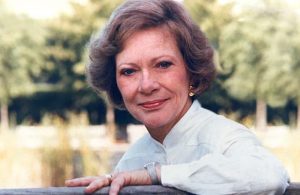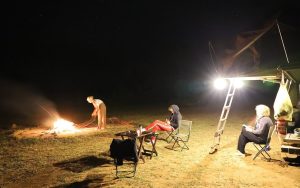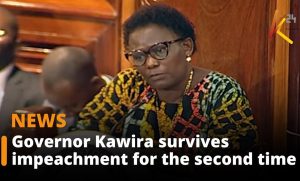A news item about women carried last week by a Christian news agency caught the attention of The Bulletin. It was titled, ‘Church holds women dearly, says Cardinal’:
‘The church will continue to support women in their religious activities, says Cardinal Njue. The church, he said, appreciates the important role played by women. “You can always count on us when it comes to assisting you advance your religious activities,” said Cardinal Njue.’
What is interesting here is that, if indeed Cardinal Njue said those words, he succeeded in portraying women as mere appendages to “the church”, which here appears to be “us” – presumably Njue and certain other people not named in the report.
But since The Bulletin is not a theological journal, that as far as we are concerned is the smaller sin. The bigger one is the manner in which the news agency basically stripped down a major women’s event to the bare bones of just one man’s views.
Njue spoke at the third convention of the Kenya National Council of Catholic Women (KNCCW) held at Nyayo Stadium. The function was attended by Catholic women from around the country.
“Earlier, the KNCCW chairlady, Mrs. Emily Oduma, had urged the church, through Cardinal Njue, to assist them to put up a retreat centre in Nairobi…” the story went on.
Even the organization’s leader appeared to think, according to the report, that “the church” constitutes Cardinal Njue and others, the women excluded.
Perhaps if the big man had not attended the function, and only the women were present, the agency would have considered the event less newsworthy.
This is generally a common practice in Kenyan news reporting. It is often the big man, yes man, who is the focus of media attention – even when the event is by women and about women.
But that tends to change in most negative news, where the media invariably depicts women as the victims. If the church story under discussion was about a tragedy, the report would most certainly have appealed to public sympathy by dramatizing the suffering of the women involved.
Media coverage of the drought and famine in Kenya and the Horn of Africa comes to mind. Who did those haunting pictures on TV and in the newspapers feature? Men? Yes, a few elderly men, but mostly women and children. Check out the pictures published by Daily Nation last Wednesday in a feature titled, ‘When the shillings poured in’ (DN2, Pg.2)
Women are often portrayed not only as the victims of some failures or tragedies but they are also presented as being dependent on the men for their very lives. They are not equal partners to the men in any endeavour. Without the men they cannot on their own do anything. You get that impression in the church story.
A harambee was conducted during the women’s convention for construction of a retreat centre. Whose contributions were reported by the news agency?
“Cardinal Njue made his contribution of Ksh200,000, the Kenya Catholic Secretariat gave Ksh100, 000, while the Apostolic Nuncio to Kenya, Archbishop Alain Paul Nuncio (Lebeaupin?) gave Ksh30,000.”
Apparently, no women gave any money worth reporting about.
This picture of Woman is, of course, not only false but grossly unjust in the 21st Century world. Everywhere in this country, women have demonstrated throughout history that they are achievers in minor and spectacular ways.
It was with this in mind, we believe, that The EastAfrican newsweekly devoted 15 pages in last week’s issue to celebrate the region’s female achievers. Reading through the special coverage, a better picture of Woman emerges.
We have said here that we acknowledge the right of religion to organize its own space: a religious entity is free, for example, to define for its followers what constitutes “the church”. But it is unacceptable that a religious organization, its spokesmen or affiliates, promotes perspectives and ideologies that run contrary to the values of the Constitution.
Our Supreme Law recognizes that women and men are equal in dignity and rights. In this country, Christianity is quite influential. No one can underestimate the force of its views on the minds of many citizens. Therefore the views of church leaders or spiritual organizations about women must not be allowed to erode constitutional values.
Church leaders – largely men – have said they support the Constitution despite opposing it at the referendum. That is great. They have even asked to be included in its implementation. Good.
But such involvement must not be defined narrowly as appointment of religious figures to key commissions. It means, quite significantly, that religious leaders (and politicians, maize roasters, ‘dere na konda wa mathree’, everyone) should use their space to champion the values of the Constitution. It is the duty of every citizen.
It would, therefore, be insincere for a religious leader to purport to support the Constitution while undermining its values in his sermons.
As well, in this New Order church media – and all other media – must champion the Constitution. Obsession with the big man and the depiction of women as always the victims, or as somehow inferior to men, should be left to the Neanderthals.
Radio presenter Joshua arap Sang’ who is facing serious criminal charges told the International Criminal Court at The Hague last week that he is a professional journalist with experience spanning 12 years. His ambition is to be the greatest broadcast journalist not just in Kenya but in the world.
Sang’ said that, having been trained at diploma and degree levels, he fully understood journalism and its ethical codes. He therefore could not have used his position as Kass FM presenter to take part in organizing killings, maiming and mass displacement of people during the post-election violence of 2007/8 as alleged by the ICC Chief Prosecutor Louis Moreno-Ocampo.
Instead, Sang’ said, he used his programmes to promote peaceful co-existence among the different communities living in the Rift Valley. He invited leaders of different political persuasions to his shows. He wasn’t a member of ODM and couldn’t have been party to planning and executing the violence that targeted perceived PNU sympathizers.
In fact, being a journalist, Sang’ couldn’t have been a member of any political party because he always strived to give equal opportunity to all sides of the political debate ahead of the election, he said.
Well, it is up to the ICC judges hearing Sang’ to determine the veracity of his claims. But his arguments make a certain erroneous claim about ethical journalism that needs correcting.
Whereas accuracy and fairness are the first cardinal principles of journalism according to the Code of Conduct and Practice of Journalism in Kenya, it is not unethical for a journalist to be a member of a political party. He or she retains his constitutional right to the freedoms of association and of opinion. That is why a journalist expresses his or her political opinion by voting for a certain candidate at elections.
What ethical journalism requires, though, is that, in the public interest, every effort should be made to ensure that one’s personal views on politics or any subject do not influence their professional work.
“Journalists, while free to be partisan, should distinguish clearly in their reports between comment, conjecture and fact,” the Code stipulates.
All we would like to state here is that the impression must not be created that journalists should not belong to political parties, champion political causes or hold political opinions. As citizens, they are entitled to these and other rights and freedoms guaranteed by the Constitution.
Several months ago, Mr. Raphael Tuju, then a presidential advisor on media and ethnic relations, embarked on nationwide tours to promote nationalism especially among the youth through an organization called Kenya Hope Foundation.
Tuju’s initiative received plenty of coverage. Everywhere he went there were news reports about it. But here at The Bulletin we were a bit skeptical.
Tuju was appointed to his job, a public office paid for by the taxpayer, shortly after he lost his seat in the 2007 election. There have been numerous initiatives to promote peace and unity in Kenya since the post-election violence. Why did it take him more than three years to realize the importance of a nationwide campaign against tribalism? Was that part of his mandate, considering that we have the Kibunjia Commission?
The answer came the other week when Tuju quit his job and announced his entry into the race to succeed President Kibaki. It is impossible not to conclude that the Kenya Hope Foundation activities were actually part of his strategy to launch his political agenda – although the media decided not to see things that way.
Nobody has seemed interested in asking Tuju any questions. The launch of his presidential campaign at a Nairobi hotel has received considerable media attention.
What does Tuju stand for and how has he demonstrated it? What did he achieve in his past political jobs? How has President Kibaki and the coalition government benefited from Tuju’s supposed expert prescriptions on media and ethnic issues?
Did Kenyans get value for money? Is Kibaki less tribal now, three years on? Or was the job a reward for Tuju’s support for PNU in 2007? What is the man’s vision for Kenya and how does he intend to take us there?
But as far as the media is concerned, that does not seem to be the way to frame the discussion about Tuju’s presidential ambition. What is important is Tuju’s attempt to reach out to the youth (of Nairobi’s Eastlands basically), as reported in the Daily Nation on Wednesday.
“In the race for State House that has recently seen politicians embrace the use of social networks, former minister Raphael Tuju has generated the biggest buzz with a video in Sheng that is generating plenty of comments on Facebook and Twitter…”
“Rapho”, as he introduces himself, refuses to be identified with any ethnic group and simply announces “kabila yangu ni mkenya…”
We are supposed to believe, by this report, that tribalists are those people who announce their ethnic identity on Twitter, Facebook or even on the street. Really?
Tuju’s populist attempt to fight negative ethnicity and the media’s adulation of his moves are really simplistic. As a matter of fact, there is absolutely nothing wrong with belonging to a tribe. The real issue is treating all Kenyans equally without discrimination based on any grounds whatsoever. That is what our Constitution says.
The idea that Tuju, or anyone else for that matter, can help erase the various grounds of “otherness” – or that this is necessary – in order to build one Kenya is sheer rhetoric. It is even dangerous: any attempt to destroy pluralism is an assault on human freedom.
Why should a Luhyia, Gikuyu or Omogusii be harangued into feeling ashamed of his identity? Why should any Kenyan reject her ethnic identity? How would that end tribalism? How would that cut the dominance of one ethnic group in Kenya’s politics and economy?
The only meaningful project is for all citizens to embrace unity in diversity. And Kenyans are capable of that.
So, is Mr. Raphel Tuju the man who could lead Kenya to the promise of the New Order? Honestly, we don’t know. It will be up to the voters to decide – if his name ends up on the ballot.
For now, all that the media owes Kenyans is the duty of probing political aspirants beyond the excitement they might cause on Facebook or Twitter.
And finally, the sterling performance of the sons and daughters of the Motherland in Daegu, South Korea, last week was in the mind of a Nairobi journalist it seems. He must have concluded that he could pay no better tribute to our true heroes than to employ an athletics metaphor in the intro of his story. Good intention, but the resulting mess made unbearable reading:
“On starting blocks of race to pick head of the new electoral body, manager of elections next year and overseer of demarcation of 80 new constituencies, stand only four people.”
This could really be stated simply and clearly, which is what good communication is actually about.
The grotesque prose was on the Front Page of The Standard newspaper on Friday, September 2, under the headline, ‘Only four apply for top elections post.’
How did that amazing intro pass?




